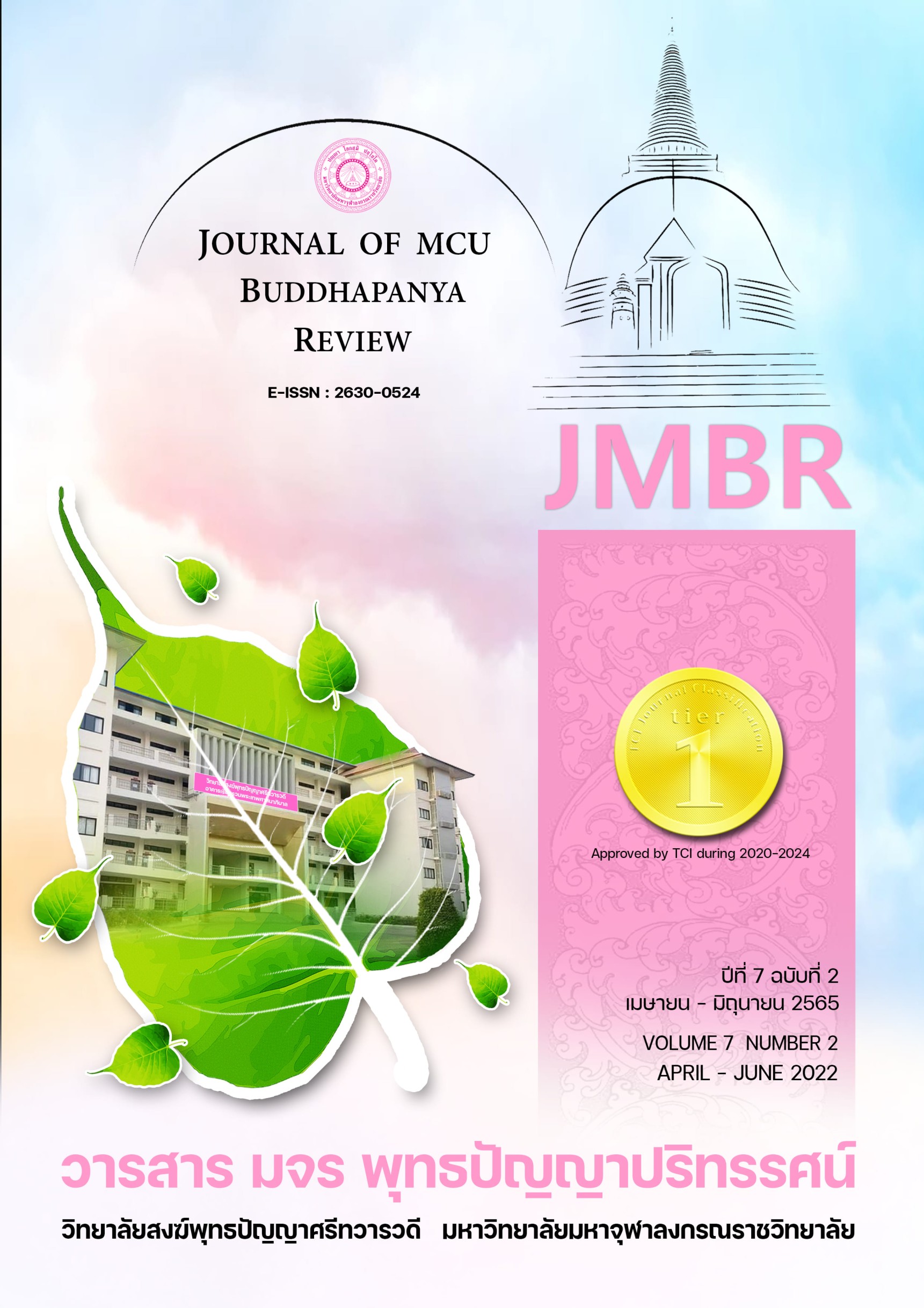AN APPLICATION OF ONLINE PSYCHOMETRIC ASSESSMENT; EMERGENETICS® PROFILE TEST, FOR UNDERSTAND LEARNING STYLE IN ENGLISH WRITING’S PROCESS OF VOCATIONAL TEACHERS STUDYING IN MASTER LEVEL
คำสำคัญ:
Online Psychometric Assessment, Learning Styles; English Writing; RecorrectionProcess; Emergenetics® Profile Testบทคัดย่อ
This research aimed 1) to study the development of English writing process of vocational teachers who studied at the master's degree level by recorrection, 2) to group the learning approaches of learners using Emergenetics®; the online learning approach assessment, and reflect on assignments’ scores of each learning group, 3) to present the results of the satisfaction survey based on the recorrection method. The purposive sampling is 14 vocational teachers in the fields of Tourism, Mathematics and Thai. Their average age was 35 and studied English with the communicative approach. This research was action research by recorrecting assignments with descriptive review from lecturers and Emergenetics® test result to develop the writing process. The statistics were mean, standard deviation, Pair Sample t-Test and One-way ANOVA.
The results were; 1) The result of learners' writing process by re-editing twice with the lecturer comments on 4 topics; Writing an Introduction, Extended Essay, Explaining Picture and Freehand Writing. The recorrection resolves problems of fragmentary writing, writing extended version, better clarified thesis statements and stop using the bullet points. The overall score of the assignments before and after the recorrection was significantly different at the .05 level. 2) The pattern and sequence of their writing’s problem then grouped and confirmed by Emergenetics® test; Conceptualizing for 2 persons, Structural learning for 5 persons, Social Relations for 4 persons, and Analytical learning for 3 persons. The overall writing scores of each group were =15.80, S.D.=0.00, =14.60, S.D.=1.28, =13.07, S.D.=0.90 and =12.43, S.D.=0.32. The average score of each Emergenetics® group was different at the .05 level. 3) The overall student satisfaction was at a very good level ( = 4.18 and S.D. = 0.15). In conclusion, the recorrection process suited Thai adults studying English using a communicative approach. The students’ writing capability was comprehensible with the results of Emergenetics®. The thought processes of people indicated the style and preference of writing.
เอกสารอ้างอิง
Akaranithi, A. and Panlay, S. (2007). Tensions in Policy and Practice in Self-directed Learning,
in: Reconstructing Autonomy in Language Education, Barfield A. and Brown, S.H. Eds.
London: Palgrave, Macmillan, pp.-43-55.
Browning, G. and Williams (2006) Emergenetics®: Tap into the new science of success, New
York: Harper Collins Publishers.
Darasawang, P. (2007). English Language Teaching and Education in Thailand: A decade of
Change. In: English in Southeast Asia: Varieties, Literacies and Literatures, Prescott, D., Ed. Cambridge: Cambridge Scholars Publishing, pp.- 187-204.
Edwerd, V. (2008). “Building on experience: meeting the needs of Chinese students in: British
Higher Education.” in: Internationalising the university: the Chinese context, Coverdale, T., and Rastall, P., Eds. Basingstoke: Palgrave Macmillan, pp.- 185-205.
Emergenetics®.com.(2018). Emergenetics® Explain. Colorado. USA. Retrieved From: https://www.Emergenetics®.com/Emergenetics®-lab/
Fiordispini, F. (2017). Applying Experiential Learning to Emergenetics® Workshops. Retrieved From https://www.linkedin.com/pulse/applying-experiential-learning-emergenetics-workshops- fiordispini
Honey P., and Mumford, A., (1986:b). Learning Styles Questionnaire, Oxford: Peter Honey Publications Ltd.
Horpibulsuk, N. (2022a). Social capital, exploratory and exploitative learning in Ethnic Minority Enterprises: Case Studies of Local Cultural Product, Northern Thailand. Journal of MCU Buddhapanya Review. 7(1) 1-15.
Kalong, K. (2016). The Development of English Writing Competency of Thai EFL Students by
Using Peer Review. VAKANA Journal of Language and Linguistics, 4 (1), 19-37.
Kolb, D.A and Fry, R.E. (1975). Toward an applied theory of experiential learning, in: Theories
of group processes, Cooper, C., Ed. NY: John Wiley & Sons., pp.-1-14.
Lee, A. and Murray, R. (2015) “Supervising writing: helping postgraduate students develop as researchers.” in: Innovations in Education and Teaching International. 52 (5). Retrieved from: http://norsi.no/wp-content/uploads/2016/09/Lee-Murray-2015.pdf.
LaPrairie, K. N., & Slate, J. R. (2009). Grouping of students: A conceptual analysis. International Journal of Educational Leadership Preparation, 4(6).
Lussier, R. N. (2018) (11 Eds.) Human Relations in Organizations: Applications and Skill Building, N.J. McGraw-Hill Education.
Mondy, R.W. (2016). (12 Ends.) Human Resources Management. NJ: Prentice Hall.
National Statistic Office (2016). Literacy Rate of Thai People. Bangkok. Retrieved From: http://www.nso.go.th.
Pimsarn, P. (2005). (In Thai) Communicative Writing. Bangkok: Thammasart University Press. Scanlon, J. et al., 2019 (2 Eds.) The Q: skill for success level 1: the elementary English level
for university students, Oxford: Oxford University Press.
Swales, J. M. and Feak, C. B. (2012). Academic Writing for Graduate Students. Ann Arbor : University of Michigan Press.
University of Phayao Bangkok Campus (2018). Postgraduate Students. Retrieved From: https://cmbkk@up.ac.th
University of Warwick (2018). Mark Scale. Retrieved from: https://warwick.ac.uk/services/ /aro/dar/quality/categories/examinations/marking/pgt/socialstudies/
Zhang, W. and Yin, L.C. (2018). Researching Innovations in English Language Writing Instruction:
A State-of-the-art Review. Jltr. Journal of Language Teaching and Research, 9 (1) Retrieved from: http://jltr0901.pdf (academypublication.com)
ดาวน์โหลด
เผยแพร่แล้ว
รูปแบบการอ้างอิง
ฉบับ
ประเภทบทความ
สัญญาอนุญาต
ลิขสิทธิ์ (c) 2022 วารสาร มจร พุทธปัญญาปริทรรศน์

อนุญาตภายใต้เงื่อนไข Creative Commons Attribution-NonCommercial-NoDerivatives 4.0 International License.



